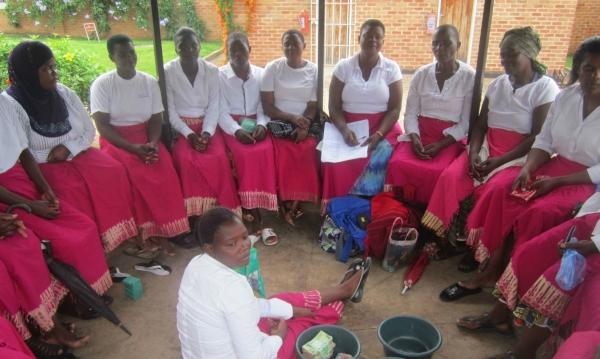Through the initiative known as village banking in Malawi, women in villages form groups and contribute small amount of money as shares on a weekly basis.
After contributing shares for some months, every shareholder qualifies to take out a loan using funds from the group shares at a 20 percent interest rate when settling the loan.
Group members strictly use the loans for small scale businesses since the objective of the initiative is to combat abject poverty.
One of the initiative's benefactors celebrating the victory song is a widow mother of five children, Justina Nyasulu, who has moved from a mud made and grass thatched house to a brick made and iron sheets house and operates stable businesses in Mzuzu city in northern Malawi.
She joined the group following economic hardships after the death of her husband in 2012. Among her problems was not being able to pay secondary school fees for her two children, monthly rent, or water bills.
“I was desperate because I had no money” and nobody to help me deal with all the problems, she said.
She joined a group of fifteen fellow poverty-stricken women in her home area and started with a low share contribution of 400 Kwacha (MWK), about 1 USD every week. Within two months they accumulated 48,000 Kwacha, about 120 USD, which they disbursed among themselves in the form of loans and started engaging in small scale businesses of their choice.
“I managed to get MWK 3,200 (or 8 USD) which I bought two 50 Kilograms bags of charcoal and started selling it in small plastic bags in the neighbourhood at MWK 100 (25 cents),” she recalled. “Today I am staying in this big house and I’m operating four cosmetics shops in town. Everyone is surprised when I’m saying Village banking is the magic behind my success.”
Nyasulu says every December the group members share money paid out comprised of savings contributions, interest earnings, fees from fines, and any profits from commercial activities the VSL may have undertaken during the year which help them to buy farm inputs such as fertiliser and maize seed.
And today, most of the group members have built iron sheet houses and are able to buy basic household items and pay school fees for their children.
With a population of about 17 million, Malawi women account for 60 percent and most live in rural areas where access to economic activities remains a challenge due to high poverty levels. The country's government, however, has reported that the village banking model has reduced poverty levels for about 75 percent of women in the country.
“Poor education and limited vocational training programs mean there are few opportunities for women to improve their poverty levels especially in rural areas in Malawi, but we are happy that this initiative is really economically transforming women in the country,” explains Dr. Mary Shawa, the government’s principal secretary for the Ministry of Gender, Children and Community Development.
She said the initiative also significantly contributes towards reduction in malnutrition among children in Malawi since most women are able to grow nutritious food and fend their families through VSLs resources. According to USAID, 45 percent of the country’s children under age five are stunted due to the lack of adequate nutrition, but Dr. Shawa believes that if adopted by 90 percent of the country’s women population, the initiative may highly contribute to reduce that figure.
“It is this potential economic outcome that has inspired government to support the initiative by providing capacity building on business and financial management ... so that they best manage their businesses and sustain the initiative,” she told HARAMBEE TODAY.
Apart from uplifting themselves economically, the group members are also taking part in the development of their communities such as constructing school blocks and bridges using profits made from their savings.
Women’s rights activists claim the initiative has also reduced cases of domestic violence against women in Malawi since most of these women are no longer dependent on their husbands.
A local women’s rights organisation called Northern Region Women Forum, which has embarked on rolling out the Village Savings and Loan initiative across northern Malawi, is now working on mobilising the groups to form a national association to woo donor funding to implement bigger projects.
“This would help the association members to source capacity building and other funding for implementing social projects to combat poverty among the women in the country,” the organisation’s administrative secretary, Judith Mkandawire, said.
Mkandawire believes the initiative would highly contribute to the country’s economy which is currently fragile due to recent resistance from donors to fund the country.
BLOG COMMENTS POWERED BY DISQUS

